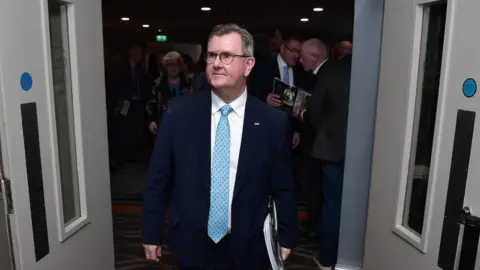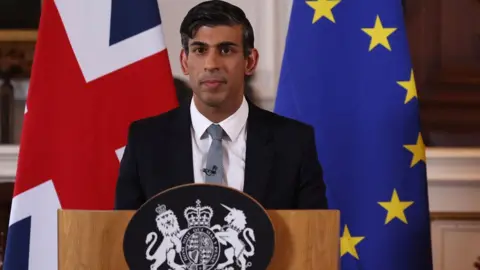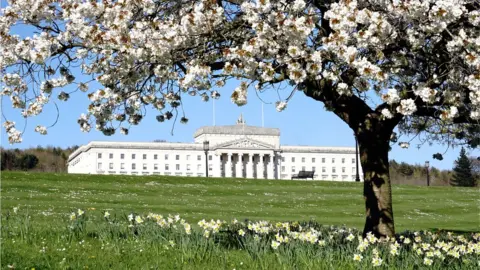Waiting for the DUP: When will the party get back to Stormont?
 Charles McQuillan
Charles McQuillanWaiting for Godot is a play by Samuel Beckett in which two characters have a series of conversations about a man who never arrives.
Northern Irish politics has its own version.
It's called Waiting for the DUP - a party which might arrive but not quite yet.
For those of us in the metaphorical audience this consists of hanging around trying to glean an idea - any idea - of whether they will go back into power-sharing government.
Whenever we leave the theatre for the real world someone is bound to ask "what do you think the DUP is going to do"?
And our reply is often: "I haven't a clue and I suspect they don't either", since it involves it receiving acceptable offer from the Westminster government which, like Godot, may never arrive.
The production consists of a number of set-piece acts which may or may not change the narrative and bring this drama to a close.
The latest one occurred in Saturday and was called the DUP annual conference.
Mind you, the same speculation preceded the previous one and absolutely nothing of any significance happened then either except for a well-known journalist being temporarily barred from attending.
 Getty/DAN KITWOOD
Getty/DAN KITWOODThe party eventually relented over her - but not over its boycott of the Stormont institutions triggered by the Northern Ireland Protocol.
Since then we've had the Windsor Framework, which Prime Minister Rishi Sunak hoped would be the final act, only for one of the ensemble cast - Ian Paisley MP - to quickly say it didn't "cut the mustard".
Others like Lord Dodds and Sammy Wilson weighed in as well and that is now the party's position and the reason negotiations are continuing behind the scenes with the government - about which no-one but a select few appear to know anything at all.
'Difficult position'
It all leads to an inordinate amount of focus on a single party which is not even Northern Ireland's biggest anymore.
But that is the way Stormont works - unless the DUP turns up neither can anyone else.
And so we wait and wait.
The collective wisdom after the conference was that Sir Jeffrey used the event as a starter course for some of the party's slow learners.
Devolution good - direct rule, or anything like it, bad was the message.
Which may mean something or nothing.
A senior DUP source said if you read Sir Jeffrey's speech in tandem with that of his very much ditto deputy Gavin Robinson they "neither spoke of a done deal nor scoffed at the potential".
It was "still all to play for".
The source also thought there was "a great buzz" adding "it felt neither as flat nor as fraught as the last time".
'Pretty exasperated'
Mind you another way of looking at it say some is that the DUP seems addicted to the attention and know the moment they either say yes or no things have the potential to get a lot more difficult.
Adam Payne of the website Politics Home says he has spoken to some in the Westminster government who are privately "pretty frustrated and pretty exasperated".
"They're trying to generate as many fig leaves as possible for Sir Jeffrey to take to his party," said Payne.
 Getty/navorolphotography
Getty/navorolphotographyThe former DUP Finance Minister Simon Hamilton acknowledged his former party is in "a difficult position".
"Some might say they've put themselves in that position," he said.
'Take the right decision'
"Other parties have by and large been quite tolerant and given the DUP a significant amount of time and space to try to sort those issues out.
"You get a sense that patience is running thin and that time may be running out.
"I would still be hopeful that Jeffrey will take the right decision and go back into the Executive."
But that may not be what happens of course.
With the DUP there's always another negotiation; or another party executive meeting in an Elizabethan manor in County Armagh.
The last lines of Waiting For Godot go like this.
"Well shall we go. Yes let's go."
They do not move.
It could have been written about the DUP.
